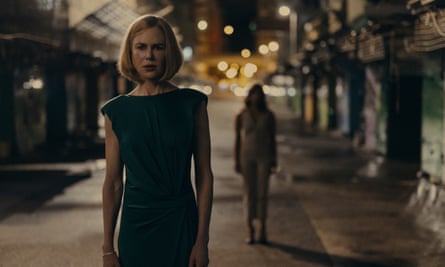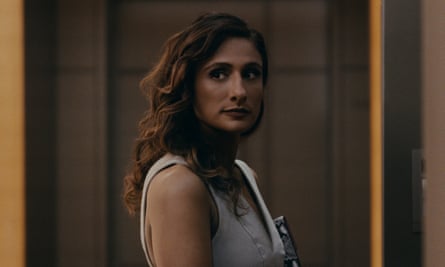I was like a donkey’: Nicole Kidman on death, love and refusing to do scenes
Given that she’s box-office gold, it’s easy to forget how spellbinding Nicole Kidman is in edgier roles. The actor and her costars in intense new drama Expats talk motherhood, grief – and causing an online furore
Zoe Williams
Friday 19 January 2024
The mood and pace of Expats is unusual, in a world of streaming where shows have to be instantly compulsive. “A very different piece of television, this,” says Nicole Kidman. “It’s a slow burn. I feel it’s more aligned to, say, Kieślowski with Dekalog, or Bergman’s Scenes from a Marriage.” Kidman is speaking by Zoom from LA, in a room with her co-stars, Sarayu Blue and Ji-young Yoo. At one point, a disembodied hand reaches into the screen to hand them all a fluffy towel to keep warm – they’re in a cold studio. I feel as if I’m on a spa day with a global celebrity, a comedy genius and a gen Z firebrand.
Directed by Lulu Wang, Expats follows the tense, tight, slightly airless lives of three women – Margaret (Kidman), Hilary (Blue) and Mercy (Yoo) – American expatriates in Hong Kong, as tragedy strikes and Margaret loses her youngest child. The part is pitch-perfect for Kidman, who does such reliable all-purpose goddess at the box office that you can forget how much she comes alive in more experimental films (Eyes Wide Shut, Birth, Stoker). Blue, who fronted the sitcom I Feel Bad and had smaller roles in Veep and The Big Bang Theory, plays straight with an insistent ironic undertow, dark humour lurking round every corner. Yoo is the industry’s new discovery, first cast for the screen in 2020, while still in the middle of her degree.
If Expats is an interrogation of loss, guilt and marriage, it’s also about class, race, privilege and belonging. At the centre sits the question: what is the difference, anyway, between an immigrant and an expat? “Expats are temporary, they’re going to be leaving,” says Yoo. “An immigrant has chosen to stay.” “It’s also,” says Blue, “about expats being their own class strata, which gives them a passport to everywhere.” Blue’s performance, as a high-achieving but calamitously ambivalent citizen of the world, is shot through with that paper-thin confidence: you know you belong, so why don’t you feel it? “I knew when I was reading the scripts that we were unpacking privilege,” she says, “and I love that Lulu doesn’t shy away from those conversations.”

The way race and heritage interact with money and status are probably most explicitly told in the character of Mercy, whose backstory is that she arrived in the US as an immigrant from South Korea, but appears in Hong Kong as a highly educated, though still skint, Asian American. “She’s so deep in her own chaos she’s not really thinking about the outside world,” Yoo says, “and how she’s affected by it, or how it’s affected by her.”
As an actor, Yoo was keenly aware “that there can be an assumption in the west that Asian Americans would feel comfortable going to Asia. But there’s this thing that happens, [that] certainly happened to me when I went to South Korea for the first time. All the South Koreans could really tell that I was American. They could tell before I opened my mouth. It was something about the way I walked, the energy.” There’s something about the ensemble, its perfect balance between Kidman, Yoo and Blue (whose parents arrived in the US from India) that is novel in a chastening way: often, as Blue says, “women of colour are put into roles that are almost like the springboard for other characters to have their stories.”
Twenty-four-year-old Yoo was the first to be cast: she wasn’t studying acting (instead cinema and media studies, at the University of South California), and didn’t even get to graduate before she landed her part in The Sky is Everywhere in 2020. “I’m technically on a leave of absence [from university],” she says. “People often ask me why was I cast, and my answer is pretty much, I don’t know. I’m very grateful, though.” Her performance is incredible: she has a fathomless stillness, a maturity that doesn’t really make sense. “She is very mature,” says Kidman. “She’s the most mature of the three of us.” She’s also pure Zoomer, a complete break from the decades-long actor tradition of treading weightlessly across “issues” like a cat: “I’m not really a believer that there’s any such thing as apolitical. To take an apolitical stance is still political. Part of being an artist is having a point of view.”
![‘I’m technically on a leave of absence [from university]’, says Ji-young Yoo.](https://i.guim.co.uk/img/media/f5224fdf48803a8164b4d3b905f1bd2aca9168a5/67_133_1164_1454/master/1164.jpg?width=445&dpr=1&s=none)
The casting was celebrity-blind, says Kidman, who is also an executive producer: “There was no talk of stars. Amazon just said, ‘Cast the show, make the show’.” Blue credits the chemistry between all three to this “thoughtful casting” and “on top of that, we really did spend time together, feeling each other out, asking questions, so that it was never, ‘Go do a scene with Nicole Kidman’. It was, ‘There’s my scene partner, my friend, a person I have connected with and developed a relationship with.’” Kidman chimes in with all the “swimming and having food and just chilling together” that went down, “including my children, including Lulu’s dog – all of that does penetrate.”
When they started shooting in Hong Kong, it was 2021, the middle of Covid, with schools still closed, planes still grounded – and there’s something palpably ominous about the city as a backdrop, with its unnaturally blue skies and eerie lack of bustle. “Those energies are just in the show,” Kidman says. “You can’t act those things.” It was piquant, given the show’s subject – expats and entitlement – that Kidman managed to get round Hong Kong’s very stringent quarantine rules by using a private jet to fly in and film. To be fair to her, a lot of rage online seemed to be more about expats’ reluctance to wear face masks than the actor flouting the rules herself.
Covid got under the skin of her performance, too. Kidman recalls one scene about her character’s lost son: “I said, ‘I cannot, cannot do this’. It was like when a donkey just goes, ‘I’m not going’. I was alone in Hong Kong without my family, which was a terrible mistake. I couldn’t just get on a plane and get to them. And they couldn’t get to me. That affected the performance, to the degree that it also affected my psyche. But it was like the domestic violence storyline in Big Little Lies. I think: people go through this, my job is to be the conduit and perform it to its absolute authentic truth. And if I’m not doing that, then I’m not serving why I work as an actor, which is to artistically connect to the way life is, in all its pain and glory.”

Kidman turns in the most exquisite performance of grief, stripped back and unprettified. “There’s a selfishness to grief that Lulu didn’t shy away from,” Kidman says, “along with the selfishness in relation to being an expat, in relation to being a privileged woman.” Blue’s character, meanwhile, is ambivalent about whether to become a mother at all. Even that juxtaposition – the grieving mother, the conflicted non-mother – feels complex, and proof of a drama that can hold the two propositions in its head at once: to lose a child, no question the worst thing, but to have one in the first place, not necessarily the best. Besides which, you just don’t see that much maternal ambivalence on screen.
“For me, as somebody who is child-free, that was a journey I went on myself,” says Blue. “It’s something I don’t see space held for very often; sometimes it’s a space we don’t even give ourselves. To see Hilary say, ‘Can somebody just tell me whether to have a baby? Is there a way I’m supposed to know?’ And it’s not that she’s cold-hearted and career-oriented. It’s not that she doesn’t respect her husband. It’s not that she already knows she never wants motherhood. It’s really, ‘Is it OK not to? Do I get to be a woman, and keep every ounce of femininity?’ I related to it on such a profound level.”
And, Yoo aside, Expats is also fascinating in the way it interrogates ageing, or rather the fallacy of having “grown-up”, of there being any such thing as a finished state. “The assumption is,” Blue says, “well, you’re in your 40s, so now you know everything, right? You’re strong, you’re whatever. With Hilary we get to watch her grow up in her marriage, in her relationship with her friends. Believe it or not, 40 is not that old.”
“A lot of times, now, you’ll have many directors telling a show like this,” Kidman says, “but this is one voice, one commitment, and it’s a very female voice.” There are also men in this drama, I should point out, and they’re all good too, but part of its originality, no question, is as Blue says, “It’s really centred around women, and women of such very different backgrounds.” Even to see that reflected – not all women are the same! – is new. Which is ridiculous! The truth is, when you write dimensional women, it’s compelling as fuck.”
Expats is on Prime Video on 26 January



No comments:
Post a Comment